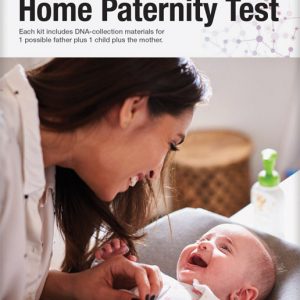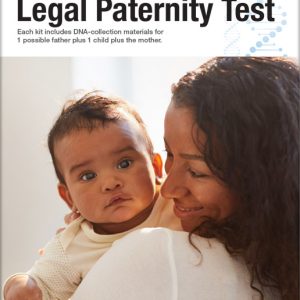
Online DNA testing has become so mainstream that it isn’t a novelty anymore. In fact, nearly 30 million consumers alone have done at-home ancestry tests. This number doesn’t even count people doing at-home DNA tests for food sensitivities, best diet and exercise, and more. These are all entertaining tests, but what about the accuracy of something with a serious life-changing outcome—like online paternity testing?
Accuracy of an Online Paternity Test
Is an online paternity test accurate? The answer is yes—an online paternity test with DNA collected at home is every bit as accurate as a court-ordered test when the DNA submitted for both tests is from the exact same people.
The report for a witnessed legal paternity test, a court-ordered test, and an online paternity test will either show a 99.9%+ probability of relationship if the man tested is considered the biological father of the child tested (not excluded as the father) or 0% probability of relationship if the man is excluded from being the father. This is as close to a “yes or no” answer as you can get with paternity testing.
If it’s Accurate, why isn’t the Report for an Online Paternity Test Accepted in Court?
At most reputable labs that perform paternity testing—including the highly-accredited DDC lab—the exact same testing and analysis processes are used for both an online paternity test and a court-admissible paternity test. The main difference is how the DNA was collected for testing.
Collecting DNA for Court-Admissible Results
With a private legal paternity test and a court-ordered one, the process includes strict chain-of-custody:
- The lab sends DNA-collection materials and necessary paperwork directly to an approved DNA-collection facility
- At the collection appointment, the collector checks IDs of test participants and takes photos
- The collector supervises/witnesses DNA collection
- That collector then seals up and sends the samples directly to the lab
DNA Collection for an Online Paternity Test
- Participants collect their own DNA at home
- One or more participants ships the samples to the lab for testing
Because an independent chain-of-custody process doesn’t exist for an online paternity test, there is always a chance that a participant may commit paternity fraud by submitting someone else’s DNA. To prevent fraud, all participants should witness each other’s swabbing and drop the samples off at the post office together.
Does Paternity Fraud Affect the Accuracy of the Test?
Let’s say a possible father really is the biological father of a child, does an online paternity test, and submits DNA for his buddy to obtain a 0% probability of paternity. Is that an accurate result? Actually, yes. Because the scientific processes are proven and this result is accurate for the samples the lab was given to test. With an online test with at-home DNA collection, the lab has no way of knowing whose DNA was submitted for testing, and so the burden is on the customer to ensure the correct people’s DNA is sent to the lab.
The Bottom Line
Accuracy is what makes an online paternity test and a legal paternity test the gold standard for confirming a biological relationship between a man and a child. And proven accuracy is why this DNA analysis is trusted by courts all over the world for cases involving custody, support, inheritance rights, and more.






0 Comments